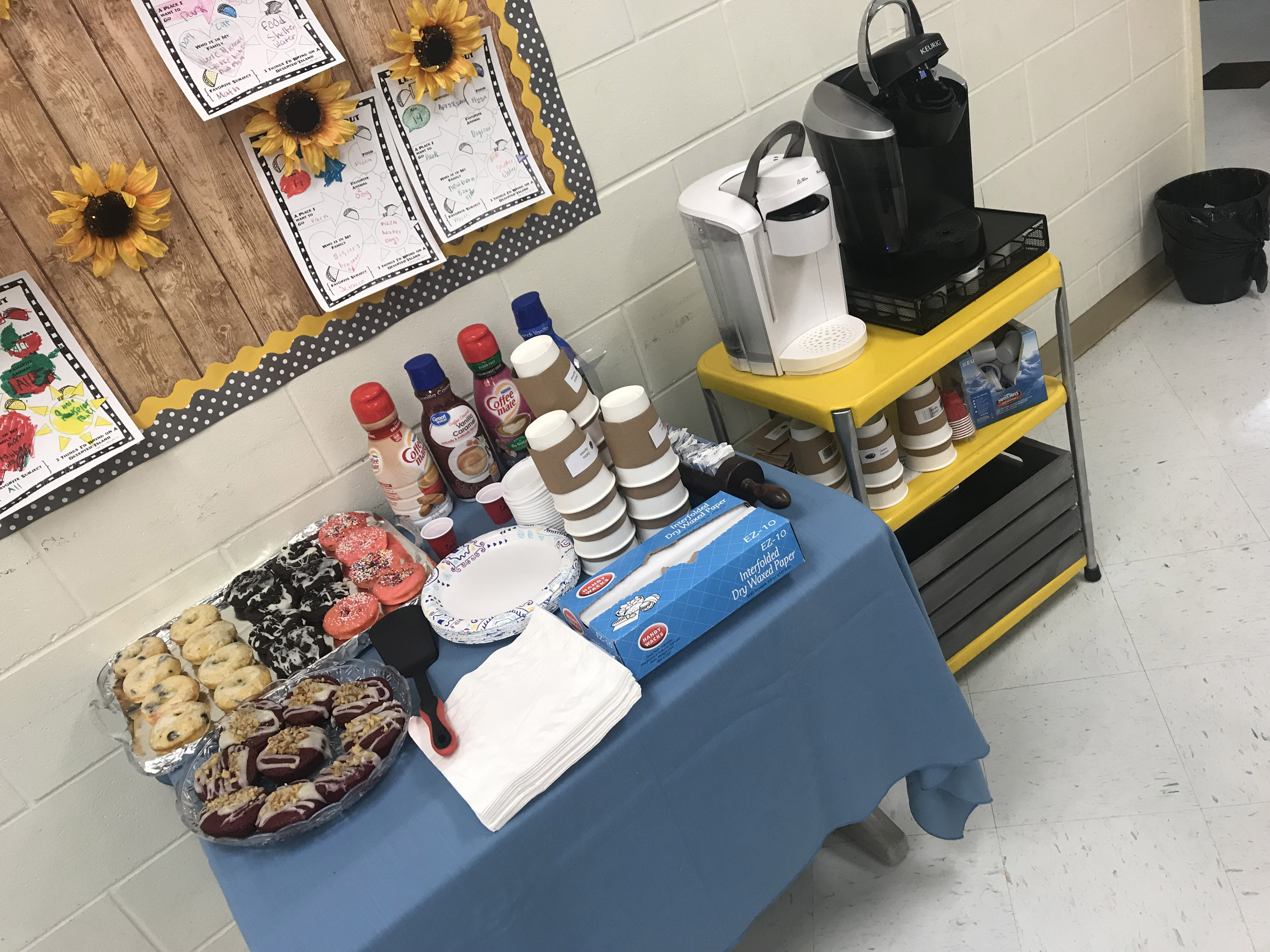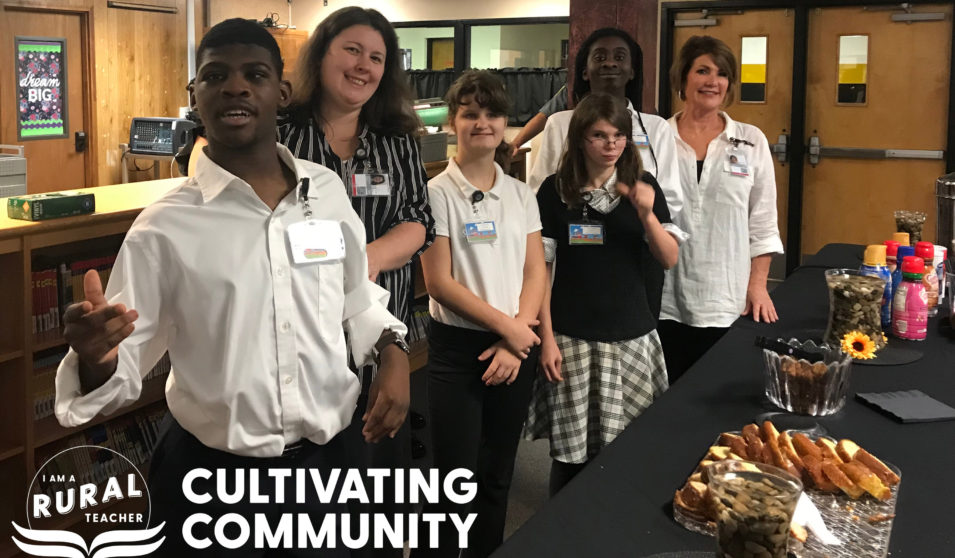“School community” means many things and looks vastly different from town to town. Yet what remains constant across the varied landscape of unique school communities is a dedication to empowering students by providing them expanded opportunities. By bringing together teachers, schools, parents, community members, and local organizations, school communities can concentrate the social forces and hard resources needed to ensure rural students thrive.
For this inaugural feature of Cultivating Community, Lisa Bufford, a special education teacher at Chattahoochee County Middle High School in Cusseta, Georgia, nicely illustrates the role and importance of school communities:
“To me it means involving stakeholders. Everybody has to be a stakeholder in this because success in the community is determined by the skill level we put out and the abilities of our students. It’s the parents, the students, the teachers, the school. It’s not a triangle, it’s more like a Venn Diagram where everyone has an overlapping stake in supporting our students.”
With a deep conviction that all students have capabilities, Bufford has led a lifelong career dedicated to inspiring students and opening up opportunities for them to learn and apply life skills in the classroom. Through a combination of her own experience, the enthusiasm of school administrators, the support of families and community members, and the excitement of her students, Bufford established the ChattCo Espresso coffee shop in the Chattahoochee County Middle High School to give students with additional needs the chance “to do something they never imagined they were capable of doing.”
“Employment in an underdeveloped rural community is a struggle for most of our residents, and there is a greater disparity in available options for young adults with disabilities,” Bufford explains. Although Cusseta hosts the US Army instillation, Fort Benning, she notes that because of the transitory nature of military life “the student population is pretty fluid, so we don’t get a lot of property taxes and there is no industry other than the military.”
Life preparedness has been a focus for Bufford from the beginning. “As a teacher,” she says, “I saw there wasn’t a lot of thought of what to do with these students after high school. A lot of pressure was given for academics but little of it for life skills and activities.”
Yet, a growing cohort of teachers and schools, like the Chattahoochee County School District, are determined to break through these barriers with innovative applications of their limited funds, such as promoting life skills through a student-run business. Bufford recollects that “during our school’s improvement planning process, it was suggested that a work pathway for business would benefit students.”
Having always wanted to run a coffee shop with her students, Bufford jumped at the chance to encourage and uplift students in Chattahoochee County:
“After hearing this [career preparedness] as a school focus, I shared with our parents and administrators that I would like my students with significant disabilities to also develop skills in business. From this, our classroom developed ChattCo Espresso—the first coffee shop for the community.”
In establishing the shop, Bufford admits that “a coffee shop is not an original idea of mine; I’m not going to sit here and say this is the first school to do such a thing. But if you look around, what is the growing industry? It’s coffee. It’s craft coffee and having those soft skills. I can’t think of a better place to train students.”
Like all great ideas however, “the coffee shop started very small,” she confides, “like only having three flavors of creamer and basically giving away coffee to get people to purchase it from us later. I bought a lot of it out of my own pocket because I thought it was
important for us to do it.” Despite its humble beginnings, ChattCo Espresso has
become a community treasure through the hard work and determination of her
students and paraprofessional, Patronia Howard.
Bufford points out that her desire to help launch ChattCo Espresso had little to do with just turning a profit—with only a staff size of 45 at the school, she “didn’t anticipate a lot of profit, it was just to be a self-sufficient coffee shop with three flavors.” For her, student experience and practicing life skills remained the guiding principle of the shop.
While Bufford reports that her students have built up all the skills necessary to run their individual stations in the shop, such as making tea, brewing coffee, creating drinks, stocking ice, and managing the register, she explains that the more profound impact of the store for students has been the chance to generate their own sense of independence, autonomy, and self-advocacy.
“The word ‘can’t’, I want them to throw it away and say ‘they’re going to try’. Now you give them a task and they see what they can do to try and accomplish it. One of my students, at a 5th grade reading level, was tasked to work on tech, and now she’s instructing teachers and developing systems in a way that she never thought she was able to do.”
Speaking frankly, Bufford says that her students would unlikely have had the chance to develop these critical social and life skills with a traditional, assignment-based curriculum:
“I feel like I’m teaching them as an adult: what do I need and how do I work? My students’ curriculum is wide-open. There’s state standards and we do teach up to the standards, but there’s so many life applications that can teach the life skills. The shop expands the daily life skills for my students and therefore helps them become contributing members of society when they leave here.”
Bufford also notes that by working in the shop, students are not only picking up life skills and newfound confidence and independence, but “putting students in these real-life situations lets you know what's needed in the classrooms” as well. Students are able to connect what they learn in the classroom to tasks in the ChattCo Espresso, giving Bufford a better idea of what each student needs to grow even further.
What Bufford and her students had originally intended to be a modest coffee service has now blossomed into a full-fledged business. From originally offering just three flavors of creamer to spice up standard coffee, ChattCo Espresso now features teas, craft coffee drinks, student-cooked foods, and even a delivery service.
“As it began to grow,” Bufford says, “I saw the goals grow and we then sold drinks to other students. Our goal now is to serve more.” To help their service grow even more, Bufford has plans for reinvesting the new profits into more facilities and equipment, such as a full kitchen, for students to use.

Although ChattCo Espresso has enjoyed wide-spread success in the school, and whole-hearted support from parents and community members, Bufford makes clear that this growth is the direct result of students’ own hard work and enthusiasm:
“We are making and giving something; we are earning that money. This isn’t just a donation, an important perspective in this program is that you earn what you get.”
The impact this program has had on Bufford’s students is conclusive. “They doubted their abilities before; they were non-assertive and reluctant. I’ve seen them all grow from this in their confidence and to be advocates for themselves, speaking up for themselves. For my students, who already have some challenges, to go into a classroom with ‘typical’ students was very difficult. But now they’re very confident. At first there was some hesitancy, just stand back and watch, but now they all want to do things and get involved.”
“I had one student,” Bufford recalls, “he had some behavior issues and he came into this program with a huge chip on his shoulder, and called me everything but a decent person. Now he is in regular classes. Now I text his mom good things and not just bad. She says this is the first time in many, many years that he enjoys school.”
As more stories of life-changing experiences like this at ChattCo Espresso are shared, the Chattahoochee County school community is responding with an outpouring of support for the business. “When community members respond with praise, their little chests just puff up and they are so proud. I can’t tell you enough what this has done for my students—to have a purpose.”




